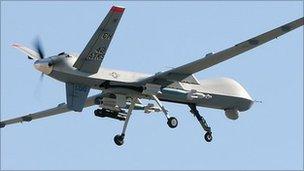Drone exclusion zone from Aberporth made permanent
- Published

Unmanned aerial vehicles are used by the military
An air exclusion zone for unmanned aircraft over parts of mid Wales is being extended and made permanent.
The Civil Aviation Authority (CAA) will extend the current seven mile (11km) zone inland from the testing base at Aberporth, Ceredigion, to 46 miles (74km), reaching the Brecon Beacons.
Business Minister Edwina Hart said it was a significant step forward in support an emerging technology sector.
But CND Cymru said many people were "deeply concerned" about the work.
The Welsh Government held a public consultation process in 2009 over plans to increase the area over which unmanned aerial vehicles (UAVs) could fly.
The new zone will enable officials to train operators and demonstrate the drones to customers.
The CAA said the decision to make the zone permanent, from 28 July, marked a "significant step forward" for unmanned aircraft systems (UAS) within UK airspace.
The new corridor, inland from West Wales Airport at Aberporth to Epynt, near Brecon, covers an area of nearly 500 square miles (1,295 sq km), and UAVs will be able to operate between 10,000ft (3,040m) and 22,000ft (6,700m).
Defence contractor QinetiQ said unmanned aircraft had a variety of uses from humanitarian aid projects to detecting storms and observing forest fires, in addition to their military use.
The Welsh Government's Business Minister Edwina Hart described the announcement as a significant step forward in support of the ongoing development of an emerging technology sector.
"The ability to have dedicated airspace and facilities available in the UK is seen as key to ensuring that Wales and the UK are at the forefront of this new and growing sector," Ms Hart said.
"It provides Wales with a unique proposition to attract companies working in this sector and also has the potential to raise the profile of Wales in international markets.
"Our ultimate aim is to create sustainable employment opportunities in the region."
Ray Mann, managing director of the West Wales Airport in Aberporth, said the new airspace would only be activated when unmanned flying was scheduled, and would be subject to "stringent safety requirements, regulated by both the CAA and the Military Aviation Authority".
He added: "The CAA announcement to allow this specialised airspace is now the strongest recognition that west Wales is the focal point for unmanned aerial systems development in the UK.
"The airspace adds significantly to the many specialised assets that already exist at the airport and gives Britain further opportunity to benefit from a market that is forecast to be worth £60bn annually by 2020."
However, Jill Gough, national secretary of CND Cymru, said the organisation was concerned about the military use of UAVs and their association with Wales.
She added: "We are disappointed but not surprised by our Welsh Government.
"Life on the planet is already damaged by human activity. People are suffering from resource depletion, pollution and disease and poverty, as a result of violence and greed.
"We hoped that Wales would be part of the solution, not, as such projects as these do, make us part of the problem."